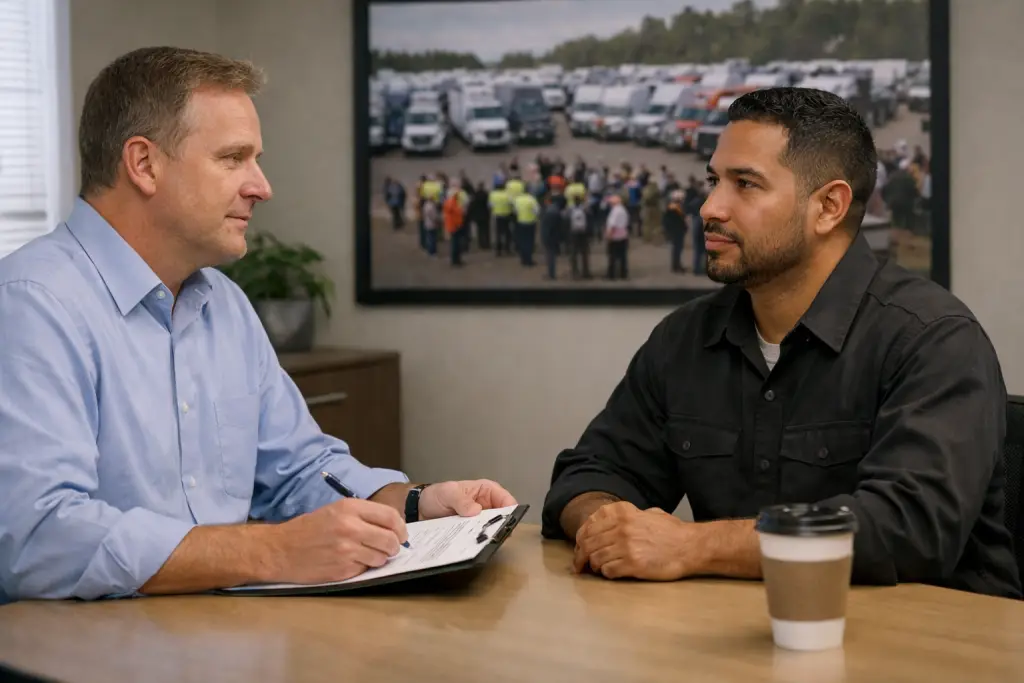Ensuring the safety and integrity of a church community is paramount. As such, conducting background checks for church staff and volunteers has become an essential practice. This article delves into why these checks are vital, how they are conducted, and what church officials and religious business owners need to know. We aim to offer a clear, informative guide.
Key Takeaways
- Background checks are vital for ensuring safety and trust within church communities.
- They help protect vulnerable groups, such as children and the elderly, from potential harm.
- Conducting background checks ensures compliance with legal standards and reduces liability risks.
- A consistent and fair background check policy fosters transparency and trust within the congregation.
- Properly handling the results with empathy and clarity maintains fairness and accountability in the vetting process.
Introduction
In any church community, safety and trust aren't just ideals but necessities. A church isn't just a place of worship; it's a sanctuary where people should feel secure. That trust hinges significantly on the integrity of those who serve, whether leading the congregation from the pulpit or volunteering behind the scenes.
In today's world, the importance of performing background checks on church staff and volunteers can't be overstated. These checks are a precautionary measure to ensure a safe and welcoming environment for every congregation member. Whether it's to protect children, the elderly, or other vulnerable groups, knowing the members of your church operations helps maintain the integrity of the community and builds a foundation of trust that everyone can rely on.
This guide explains why background checks are crucial for churches, the different types of checks, how to conduct them, and their broader impact, and provides practical, immediately applicable advice aimed at helping church officials and religious business owners keep their communities safe and trustworthy.
EXPERT INSIGHT: In August 2018, Pope Francis expressed "deep sorrow and shame, acknowledging the church's failures and the harm done to many victims. He condemned the cover-up of these abuses and promised to implement stronger measures to prevent such incidents in the future". This situation is not unique to one religious congregation; it can occur in various congregations at any level of the hierarchy, anywhere in the world, including the United States. To mitigate such risks, it is crucial to take preventive actions by regularly conducting background checks and strengthening existing measures. - Emile Garcia, SHRM-SCP, CHRP, CHRBP
Why Background Checks Are Important for Churches
Safety and Security
Protecting Vulnerable Populations: In a church setting, the congregation includes some of the most vulnerable individuals—children, the elderly, and people seeking support during difficult times. Background checks ensure that those who interact with these groups do not have a history of violent or unethical behavior. By vetting staff and volunteers, churches can better protect their congregants from potential harm and create a secure environment where everyone feels safe and valued.
Preventing Misconduct: Churches often rely on high trust between their members and staff. Background checks are an initial safeguard against bringing in individuals with a track record of inappropriate conduct. Whether it's financial misconduct, substance abuse, or other concerning behaviors, knowing an individual’s history helps prevent these issues from arising within the church community. This proactive measure supports the overall integrity and reputation of the church.
Legal and Liability Issues
Compliance with Laws: Many jurisdictions have legal requirements mandating background checks for individuals working with vulnerable populations. Failure to comply with these laws can result in significant penalties for the church. Regularly conducting background checks ensures that the church adheres to state and federal regulations, avoids legal complications, and maintains its operational license.
Reducing Legal Risk: Liability is a major concern for any institution. The church could face severe legal consequences if an incident involves someone with a known history of harmful behavior. Conducting thorough background checks minimizes this risk by filtering out individuals who might pose a threat, thereby reducing the church's potential exposure to lawsuits and financial loss.
Building Trust within the Community
Transparency and Accountability: Implementing a standard procedure for background checks demonstrates a church's commitment to transparency and accountability. By openly sharing their process for vetting staff and volunteers, church leaders can show congregants that they prioritize safety and integrity. This transparency is crucial in fostering a trustworthy environment where members feel confident about participating.
Community Confidence: Trust is the cornerstone of any community-based organization, and churches are no exception. When community members know that their church is taking proactive steps to ensure the safety and reliability of its staff and volunteers, their confidence in the institution is bolstered. This trust is essential for maintaining high levels of engagement and fostering a positive, collaborative community spirit.
Types of Background Checks for Churches
Criminal Background Checks
Purpose: At their core, criminal background checks aim to protect church members by ensuring that those in leadership or volunteer positions have not committed crimes that could threaten the community's safety. The checks help identify any history of violent behavior, abuse, theft, or other criminal activities that might indicate a person may not be suitable for working with vulnerable populations like children or the elderly.

Components: A comprehensive criminal background check typically includes several crucial elements to provide a full picture of an individual's criminal history. This involves checking national and local criminal databases to uncover felony or misdemeanor convictions. Additionally, it often includes a review of sex offender registries and sometimes a search of federal criminal records for more severe offenses. One should also expect court records, incarceration records, and probation or parole details to be included. The depth of these components ensures that church staff and volunteers have been thoroughly vetted, aligning with best practices in maintaining a secure and trustworthy environment.
Reference Checks
Importance: Verifying a candidate's background is paramount in any organization, including churches. While criminal and credit checks provide valuable data, reference checks offer insights into an individual’s character and work ethic that databases can’t capture. They help confirm that potential staff or volunteers have the qualities and experience they claim to possess. For a church, where trust and interpersonal relationships are vital, this step ensures that new team members uphold the community's values.

Execution: Conducting effective reference checks can seem daunting, but it’s more straightforward with a structured approach. Here are some tips:
- Prepare Specific Questions: Focus on queries that reveal the candidate’s reliability, competence, and suitability for the role. Questions might include, "Can you provide examples of their ability to work with others?" or "How do they handle conflict?"
- Be Consistent: Ask the same core questions across all references to maintain fairness and gather comparable information.
- Listen for Red Flags: Pay attention to vague, hesitant, overly cautious or non-committal responses. Another question that might be helpful in such an instance is to ask them if they would want to work or be with the person again. The response that you will get may open for more questions or will definitely tell you it warrants further investigation.
- Cross-Verify Information: Match the reference's feedback with the applicant’s resume and interview responses. Any discrepancies should be clarified with the candidate.
- Maintain Confidentiality: Ensure that the information shared by references is kept confidential and used solely for the hiring process.
In essence, reference checks bridge the gap between documented history and personal experience, providing a more well-rounded view of potential staff or volunteers' fit within your church community.
Credit Checks
Relevance: Credit checks might not be the first thing that comes to mind when considering background checks for church staff and volunteers. However, they can be particularly relevant for certain positions, especially those involving financial responsibilities. For instance, a credit check provides critical insights if an individual handles donation and manages the church’s financial accounts or oversees budgets. It helps evaluate whether the person is reliable and responsible with church finances.

Components: A credit check typically includes a comprehensive report on an individual's credit history. This report will show various components such as:
- Credit Score: This number gives an overall sense of financial health.
- Credit Accounts: Details about current and past credit accounts, including credit cards, mortgages, and loans.
- Payment History: Information on whether the person has consistently paid their bills on time.
- Outstanding Debts: A summary of debts that have yet to be paid off.
- Bankruptcies and Foreclosures: Records of significant financial distress like bankruptcy or foreclosure.
Understanding these components helps make informed decisions about the individual's suitability for financial stewardship roles. While a poor credit history should not automatically disqualify someone, it can guide further discussions and assessments regarding their financial responsibility and integrity.
Other Specific Checks
Driving Records
Driving records are crucial to the vetting process, especially for transportation roles. Whether shuttling congregants to services, delivering supplies, or taking the youth group on retreats, checking driving records helps ensure that only responsible, safe drivers are entrusted with these duties. Driving records typically reveal past traffic violations, DUIs, and other infractions. This allows you to filter out candidates with a history of reckless behavior, safeguarding your community on the road.
Sex Offender Registry
The importance of checking the sex offender registry cannot be overstated. This step is essential to prevent registered sex offenders from having unsupervised interaction with vulnerable groups, such as children and the elderly. A straightforward search on the sex offender registry provides peace of mind, showing whether a potential volunteer or staff member has been convicted of sex crimes. Given the gravity of these offenses, this check is a non-negotiable aspect of a comprehensive background screening process. It helps maintain a safe and welcoming environment, reinforcing trust within your church community.

How to Conduct Church Background Checks

Developing a Background Check Policy
A solid background check policy sets the foundation for a well-vetted and trustworthy church community. This policy should outline who will be subjected to background checks, what types of checks will be conducted, the frequency of these checks, and how the results will be handled. Begin by identifying the key positions that require thorough vetting—typically, these would include anyone working with children, the elderly, or handling financial matters.
Your policy should also detail the steps to follow if a background check reveals concerning information. Establish criteria for what types of findings are considered disqualifying and ensure this is communicated clearly to all applicants. Equally important, a standard procedure for re-evaluating staff and volunteers should be adopted periodically rather than treating the background check as a one-time hurdle.
Consistency is crucial. Applying your background check policy uniformly across all candidates and current staff members helps avoid potential claims of bias or discrimination. Maintaining a fair and transparent process fosters trust and reliability within your community.
A comprehensive background check policy protects the church and reassures the congregation that safety is a top priority. Ensure that this policy is well-documented, easily accessible, and regularly updated to align with any changes in laws or best practices.
Partnering with Reliable Providers
When conducting background checks, it's crucial to choose a reliable provider. Here’s a straightforward guide to help you pick the right service.
Choosing a Service: First, don’t just choose the cheapest option. Credible background check providers offer comprehensive screening and adhere to legal standards. Look for a service that covers all the necessary bases: criminal history, reference checks, and relevant specific checks like driving records or sex offender registries.
For a deeper dive into what constitutes a thorough screening process, check out "Understanding Criminal Background Checks".
What to Look For: When considering a provider, ensure they offer the following essential features:
- Comprehensive Reporting: The service should offer detailed reports that cover all relevant areas, including criminal records, previous employment, and education verification.
- Legal Compliance: Ensure the provider complies with all federal, state, and local laws. They should be knowledgeable about regulations like the Fair Credit Reporting Act (FCRA) and offer guidance on how to meet legal standards.
- Data Security: Sensitive personal information needs to be protected. Ensure the provider uses secure methods for data transmission and storage.
- Ease of Use: The interface should be user-friendly for both the church and the applicants.
- Customer Support: Reliable customer service can be a lifesaver if you encounter issues or have questions during the process.
Selecting a trusted background check provider ensures a safer, more secure environment for your church community.
Ensuring Legal Compliance
Navigating the labyrinth of legal requirements surrounding background checks is non-negotiable for church officials. Not only do these guidelines help protect the institution from potential lawsuits, but they also ensure a fair and just process for those being vetted. Here’s a straightforward rundown of how to stay within the bounds of the law while conducting background checks.
FTC Guidelines
The Federal Trade Commission (FTC) sets specific rules for employers, including churches, regarding background checks. Key takeaways from the FTC’s guidance on background checks can be found in their resource, "Background Checks: What Employers Need to Know".
- Disclosure and Consent: Before pulling a background check, you must inform applicants or employees and get their written consent. This disclosure should be clear and not buried in other paperwork.
- Adverse Action Protocol: If the background check results lead you to take an adverse action (like rejecting a candidate), you must notify them, supply a copy of the report, and inform them of their rights to dispute any inaccuracy.
EEOC Recommendations
The Equal Employment Opportunity Commission (EEOC) offers additional guidance to ensure background checks are used in a manner that doesn't result in discrimination. Here's what to keep in mind:
- Equal Treatment: Apply the same standards to all employees and volunteers, regardless of race, background or orientation. Consistency is crucial to avoid claims of discrimination.
- Job Relevance: Evaluate only information pertinent to the job or volunteer work. For instance, a minor traffic violation may be irrelevant for a clerical position but critical for a transportation role.
- Individualized Assessment: Before making a final decision, consider the context of any negative findings. The nature of the offense, the time elapsed since it occurred, and its relevance to the job should all be factored in.
By adhering to these FTC and EEOC guidelines, church officials can ensure that their background check processes are fair, legal, and transparent—ultimately fostering a safer and more trustworthy community.
Handling the Results
Reviewing Background Check Reports
When you get the background check report, it might be a bit overwhelming at first. Here are some straightforward tips on how to interpret and assess the data:
- Double-Check for Accuracy: Always start by verifying the report's accuracy. Errors can happen, so ensure the information pertains to the right individual and there's no mix-up with names or details.
- Understand the Basics: Familiarize yourself with common terms and categories in the report. This includes understanding criminal records, employment history, and other relevant sections.
- Red Flags: Look for common red flags, such as violent offenses, theft, fraud, or any recurring issues that might indicate a pattern. However, it’s critical to consider the nature and severity of the offenses.
- Focus on Relevance: Pay attention to findings directly relevant to the individual's role. For example, a driving-related offense might be more critical for someone responsible for transporting congregants than for an administrative role.
- Legal Adherence: Ensure that your evaluation follows legal guidelines. This will protect the church and ensure fairness to the applicant.
- Consistency: Review the results with a consistent approach. Establish clear policies for how different types of information will influence your decision.
Taking a systematic, fair, and thorough approach to reviewing background check reports can help you make informed choices that maintain the integrity and safety of your church community.
Making Informed Decisions
Context is Key
When you're interpreting background check results, context is crucial. A red flag doesn't automatically mean someone is unfit for a role. Take, for instance, a minor offense from years ago; it might not carry the same weight as a recent serious crime. Look at the nature of the offense, the time elapsed since it occurred, and any evidence of rehabilitation. This balanced approach helps you weigh the potential risk against the candidate's benefits to your community.
Final Decision
Once you've considered the context, it's time to decide. Stick to the facts, and be consistent with your policy. If your policy states that certain offenses are automatic disqualifiers, adhere to that guideline. However, input from multiple stakeholders should be gathered for less clear-cut cases. Remember, this isn't just about protecting your community—it's also about fairness. Making an informed decision means balancing safety with compassion.
Communicating with Applicants
Transparency
When it comes to background checks, transparency is your ally. Being upfront with applicants about the process and the findings builds trust. Let candidates know from the get-go that a background check is part of the vetting process. This can be as simple as including a brief mention in the job listing or volunteer description. Clearly outline what the background check will entail and why it matters for the role they are applying for. Doing this sets expectations and demonstrates your commitment to maintaining a safe and trustworthy community.
Opportunities for Explanation
Background checks can sometimes uncover information that may raise questions but doesn't necessarily indicate a red flag. Handling these situations fairly is crucial by allowing applicants to provide context. If you come across a concerning finding, don’t jump to conclusions. Reach out to the individual and discuss the results openly. Let them explain the circumstances behind the findings. Whether it's a minor legal issue from years ago or a financial hurdle they've since overcome, understanding the full story helps make a balanced, informed decision. Remember, everyone has a past, and the key is to assess whether that past poses any risk to your community today. Balancing firmness with empathy in these conversations can go a long way in creating a fair and respectful selection process.
Frequently Asked Questions (FAQ)
Why are background checks important for church staff and volunteers?
Background checks are vital for ensuring safety and trust within church communities. They help protect vulnerable groups, such as children and the elderly, from potential harm. Conducting background checks ensures compliance with legal standards and reduces liability risks.
What types of background checks should churches conduct?
Churches should consider conducting criminal history searches, sex offender registry checks, identity verification, and reference checks for all staff and volunteers. Additional checks, such as credit history or driving records, may be necessary depending on the specific role.
Are background checks legally required for church volunteers?
While not universally mandated, many states require background checks for individuals working with children or vulnerable populations. Churches must comply with these laws to avoid legal challenges and ensure the safety of their congregation.
How often should churches update background checks for their staff and volunteers?
It's recommended that churches conduct background checks upon initial hiring or volunteer onboarding and update them periodically, such as every two to three years, to ensure ongoing safety and compliance.
What should a church do if a background check reveals a criminal history?
If a background check reveals a criminal history, churches should assess the relevance of the offense to the individual's potential role, considering factors like the nature of the crime, how long ago it occurred, and evidence of rehabilitation. It's important to handle such situations with sensitivity and in accordance with legal guidelines.
How can churches ensure the confidentiality of background check information?
Churches should implement strict data protection policies, ensuring that background check information is accessible only to authorized personnel and stored securely to maintain confidentiality and comply with privacy laws.
What are the costs associated with conducting background checks for churches?
The cost of background checks can vary depending on the depth of the screening and the service provider. Some organizations offer discounted rates for non-profits and religious institutions. It's advisable to research and select a reputable provider that fits the church's budget and needs.
Can churches conduct background checks in-house, or should they use third-party services?
While some aspects of background screening can be handled internally, partnering with professional background check services ensures thoroughness, legal compliance, and access to up-to-date databases, thereby enhancing the reliability of the screening process.
What legal considerations should churches be aware of when conducting background checks?
Churches must comply with the Fair Credit Reporting Act (FCRA) and any state-specific laws when conducting background checks. This includes obtaining written consent from individuals before screening and providing them with a copy of the report if any adverse action is taken based on the findings.
How can churches implement a background check policy?
Churches should develop a clear, written policy outlining the procedures for conducting background checks, criteria for disqualification, frequency of screenings, and measures for maintaining confidentiality. Training staff on these procedures is also essential to ensure consistency and legal compliance.
Can we conduct church background checks on all volunteers?
Generally, background checks can be conducted on all volunteers, but it should be done transparently. Ensure you have written consent from the volunteers before proceeding and communicate the purpose of the checks. Always tailor the checks to the specific roles and responsibilities, focusing more rigorously on positions involving vulnerable populations like children or the elderly.
What information can we legally obtain?
The information you can legally obtain varies by jurisdiction but generally includes criminal records, employment history, and educational qualifications. Always adhere to local, state, and federal laws, ensuring the privacy and rights of the applicants are respected. Use only legally permissible data when making decisions, and avoid discriminatory practices.
How often should church background checks be conducted?
Regularity is key. It’s recommended that background checks be conducted during hiring or onboarding and periodically, say annually or biannually, especially for roles with higher responsibilities. Establish a clear, consistent policy for the frequency of checks and ensure all staff and volunteers are aware of these practices to maintain ongoing trust and transparency.
What are our options if a church background check reveals concerning information?
If a background check reveals concerning information, don't rush to judgment. Review the context of the findings carefully. Not all red flags are deal-breakers. Engage in a candid discussion with the individual, giving them a chance to explain. Then, assess the risks and potential impact on the church community before making a final decision. Always maintain a balanced approach, prioritizing both safety and fairness.
Conclusion
This article underscores why background checks for church staff and volunteers are indispensable for ensuring a safe and welcoming environment. From protecting vulnerable populations and mitigating legal risks to fostering trust within the community, the importance of thorough vetting cannot be overstated. We've discussed the various types of background checks, from criminal to credit, and provided actionable insights into conducting them effectively and legally.
Safety is a non-negotiable priority in church communities. While respecting the privacy and rights of staff and volunteers is essential, conducting comprehensive background checks is a crucial step in maintaining a trustworthy and secure environment. A culture of transparency and accountability protects the vulnerable and strengthens the entire community's fabric of trust.
Church officials are encouraged to implement new background check policies or refine existing ones, ensuring they are thorough, consistent, and fair. By doing so, they create a safer, more welcoming space for everyone involved.
Additional Resources
- Background Check Best Practices & Challenges
- Non-Profit Background Checks: How to Vet Volunteers Safely
- Best Practices for Nonprofit Volunteer Background Checks
- Non-Profit Background Checks: Best Practices for Organizations
- Background Checks for Nonprofits: Ensuring Safety and Compliance

GCheck Editorial Team
Meet the GCheck Editorial Team, your trusted source for insightful and up-to-date information in the world of employment background checks. Committed to delivering the latest trends, best practices, and industry insights, our team is dedicated to keeping you informed.
With a passion for ensuring accuracy, compliance, and efficiency in background screening, we are your go-to experts in the field. Stay tuned for our comprehensive articles, guides, and analysis, designed to empower businesses and individuals with the knowledge they need to make informed decisions.
At GCheck, we're here to guide you through the complexities of background checks, every step of the way.






